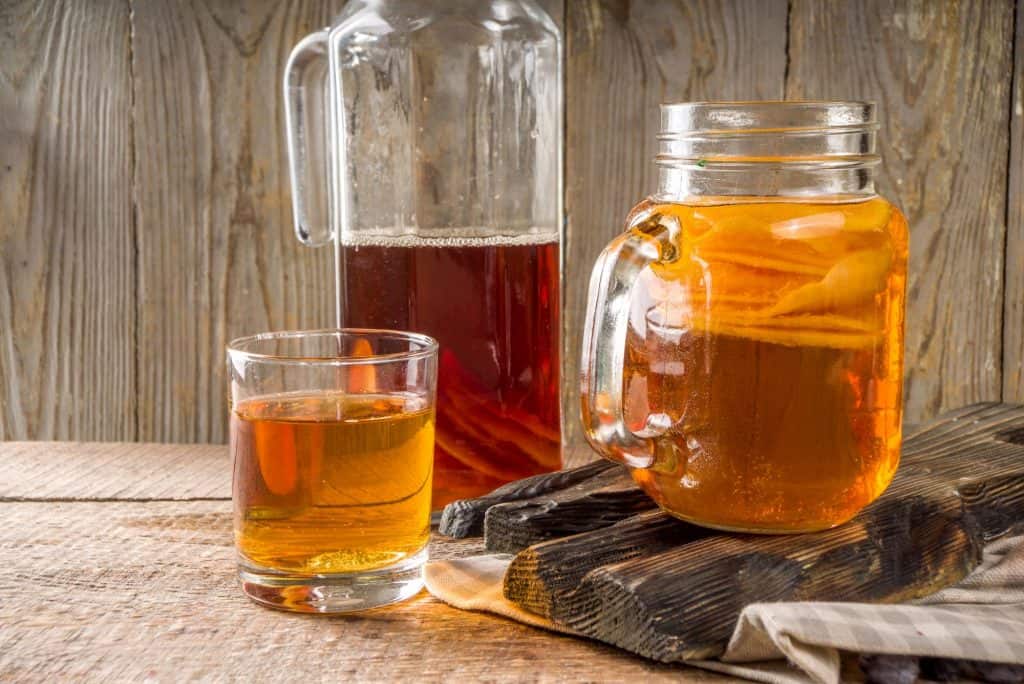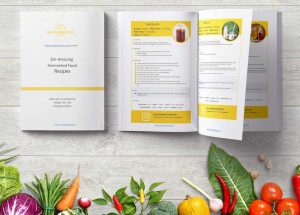
If you are concerned about kombucha caffeine content, then worry not! Kombucha tea expert Betsy Pryor assures us that just as no sugar remains in kombucha, the caffeine content of kombucha also goes down as fermentation progresses.
Let us find out the exact kombucha caffeine content in detail.
What is Kombucha
Kombucha is a healthy fermented beverage made from tea and some form of sugar. For thousands of year, people in many Eastern countries have used kombucha as a tonic, as medicine, and even as an elixir to boost health and immune system. The good news is that: kombucha can be easily made at home and many people are opting to do so, right in the comforts of their homes.
Use a Good Tea (Camelia Sinensis) for Kombucha
Tea is the cornerstone of good kombucha. You can choose from black, oolong, white, or green teas. You can even use a combination of these tea blends to brew kombucha. Just avoid the teas that contain essential oils as these are detrimental to fermentation. I hope you have checked out my basic Kombucha recipe. It is a rather simple recipe and if you follow it properly, there is no reason why you won’t end up with a delicious and tangy brew.
Kombucha Caffeine Content Depends on the Tea Used
Here are the caffeine contents of different tea varieties:
Black teas are highest in caffeine – they contain about 60-90 mg of caffeine.
White and green teas are lowest in caffeine content – they contain only about 30-70 mg
Oolong teas are in the middle – and their caffeine content is about 50-75mg.
Just as all of the sugar is eaten away by the bacteria and yeasts in the SCOBY; the caffeine is also used up during fermentation which is a vital step in Kombucha making. As a result; very little caffeine is left behind in the final brew.
Black Tea Kombucha
Black tea produces a stronger flavour in kombucha and the caffeine content is also higher. The resultant brew will have a tangy, woody flavour. Popular black teas for kombucha brewing are Darjeeling, orange pekoe, and English breakfast blends.
Green Tea Kombucha
Green tea produces a good kombucha with relatively less kombucha caffeine. They ferment quicker so always keep an eye on the tea while fermenting. The resultant kombucha is great for making blended and infused drinks.
Oolong Tea Kombucha
Oolong tea has slightly lower kombucha caffeine than black tea kombucha and slightly higher than green and white tea kombuchas. The resultant kombucha has a beautiful flavour that can be midway between woodsy and sweet-honey.
White Tea Kombucha
White tea makes a fruity kombucha with relatively lower kombucha caffeine content than black tea. White tea kombucha is rather popular with people who do not like the strong flavour of other kombucha varieties. On the downside, white tea is expensive as it is made from young buds of tea plant.
So, either way, choose some species of Camelia Sinensis and not an herbal blend. Many people believe that using herbal tea can help reduce the kombucha caffeine content. However, there is a problem with using herbal teas for kombucha brewing and I have explained this below:
Why should you Avoid Herbal Tea for Kombucha Brewing?
Herbal teas contain alkaloids which are detrimental to fermentation. However, there are brewing experts who also recommend using herbal teas like raspberry leaves, dandelions, blackberry leaves, etc. But if you are adamant on using herbal teas like these, make sure you use home grown herbs to keep contaminant levels low. Because contaminants are a lot worse for your health than a little amount of caffeine.
Home-Brewed Kombucha is best if you want Lower Kombucha Caffeine Content
Most kombucha obtained from stores is not fully ripe and, as a result, has more sugar and caffeine in it. These products hardly have the health benefits that kombucha is touted to have. So avoid store-bought kombucha entirely or, at least drink it in moderation if you want to minimize your caffeine intake.
Opt for homemade kombucha that has been fermented for at least 7-10 days. Please see my detailed kombucha recipe here. If you follow it properly, you should get a sweet-tangy kombucha with very low sugar content and pretty low kombucha caffeine content as well.
Conclusion
Kombucha caffeine content depends on the tea you use for brewing it. If you use black tea, you will have slightly more caffeine than other varieties. Worry not: the kombucha caffeine content of homemade kombucha is definitely a lot less than store-bought varieties. Also, well-fermented kombucha will also be a lot lower in both, sugar and caffeine, so you can drink this beverage without any guilt or worry!

Leave a Reply